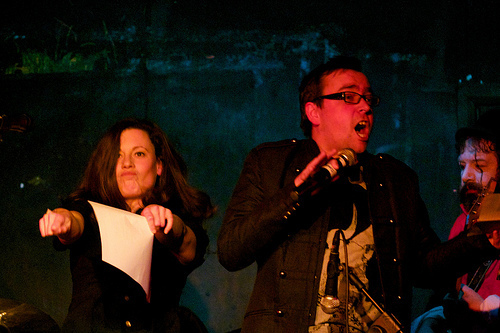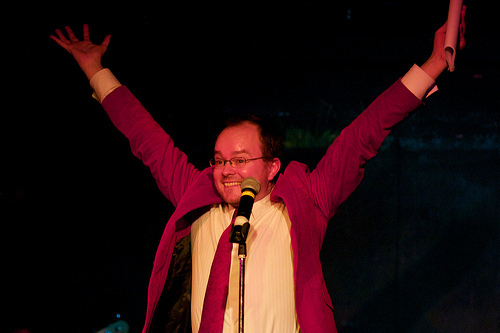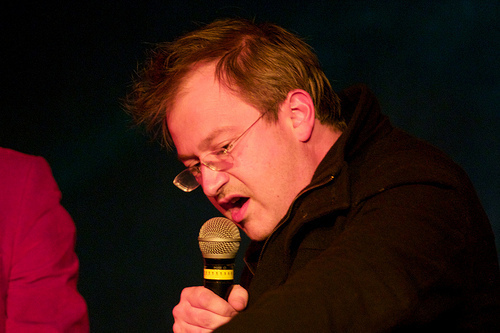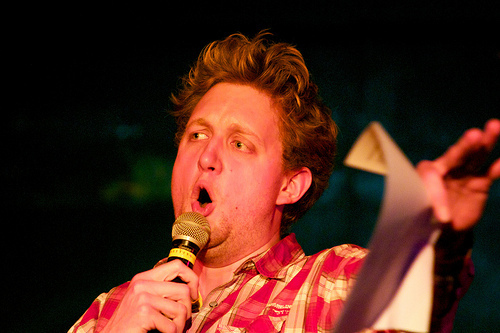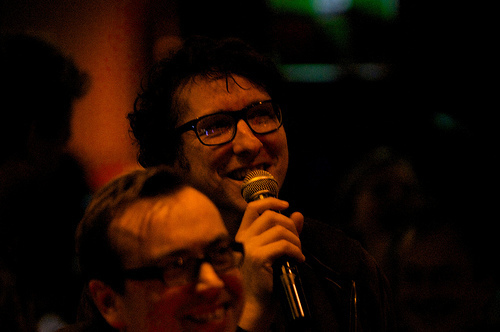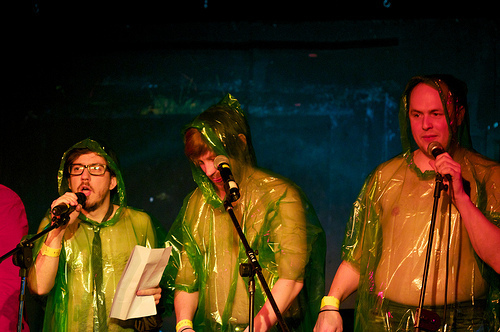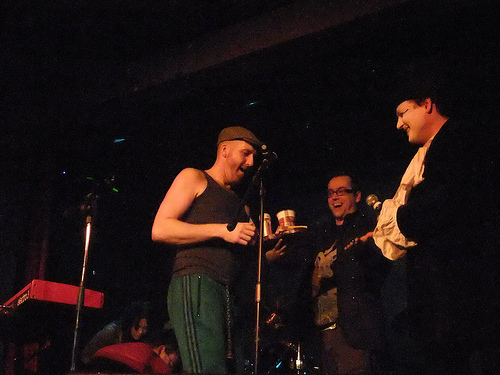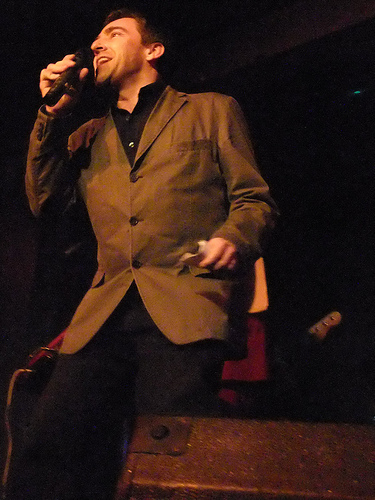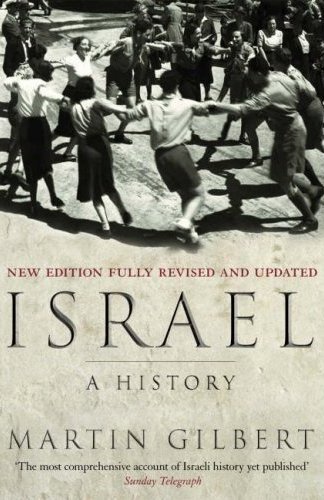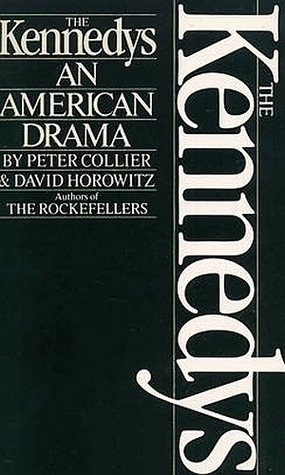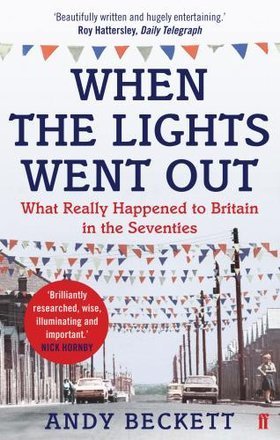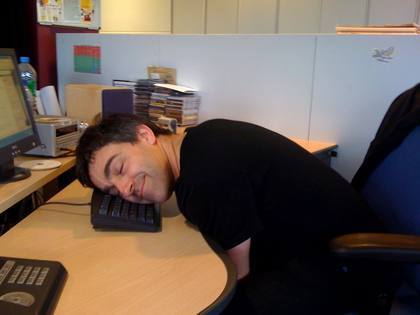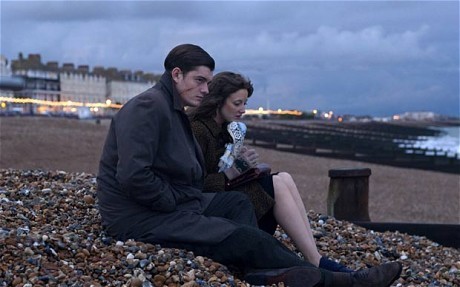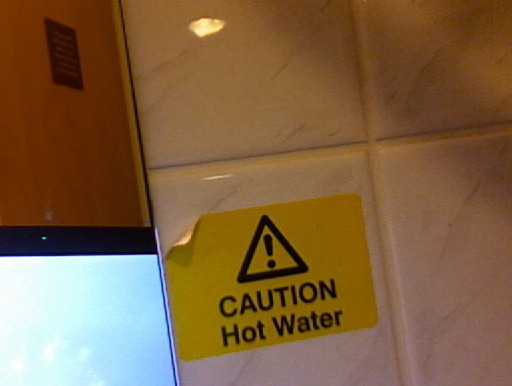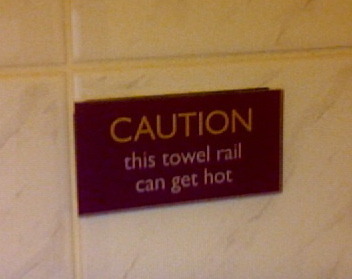Andrew Collins's Blog, page 60
February 28, 2011
A jazz thing
The Sopranos ended in 2007, The Wire in 2008. So, what did HBO do next? Well, it gave the creators of those two epic, HBO-defining shows free range to do whatever the hell they wanted. David Simon, co-creator of The Wire, went off with writer-producer Eric Overmeyer to New Orleans and made Treme, which premiered way back in April 2010 on HBO, and has finally reached our shores via Sky Atlantic. David Chase, who created The Sopranos, is currently developing a miniseries for HBO about the birth of cinema called The Ribbon Of Dreams; meanwhile, the core writers and producers of The Sopranos have spread out to form a quality drama platoon, Matthew Weiner defecting to Showtime to produce the magnificent Mad Men, Robin Green and Mitchell Burgess creating the contemporary NYPD family procedural Blue Bloods for CBS, and Terence Winter sticking around to create Boardwalk Empire.
So, three of the four major post-Sopranos shows are period pieces. Interesting. The Wire's David Simon, meanwhile, a man of the streets, is too interested in the drama around him to go backwards, which is why Treme, though set three months after Katrina in 2005, is all about now. Treme and Boardwalk are defining shows for Sky Atlantic, now airing on Friday and Saturday night, respectively. We're a number of episodes in, so worth assessing where we're at.
Treme is, in many ways, nothing like The Wire. But it gets under the skin of New Orleans just like Simon's previous show did with Baltimore. Treme, or Tremé, is a district not totally decimated by the hurricane, but predominantly black, and serves as a capsule for the themes that run through the city like wire. The main theme, though, is music. I've never visited New Orleans but I know loads of people who have – or certainly did, before Katrina – and they all say the same thing: wherever you go, there is music. Although Simon is a writer fixated on people, and against institutions (we saw them all ticked off in The Wire), he and Overmeyer have allowed music to be the heart and soul of the piece. It opens with music, it ends with music, and what's been most thrilling about the first two episodes, is that it stops to let us listen to music. Real musicians from the district play themselves – and play, themselves – and if a sense of reality is something you require from your fiction, Treme delivers.
Fictional threads arise from the constant soundtrack (which is to say, an actual soundtrack that emanates from the story, rather than a soundtrack that is layered on afterwards), but these seem to operate at the same pace as the jazz and blues. The fine cast plays as a band, but individual actors get solos: Clarke Peters – sage-like cool customer Lester Freamon in The Wire – as a father and Mardi Gras Indian rebuilding his life in the water-damaged city; Wendell Pierce – Bunk in The Wire, although a New Orleans-based musician before that, who appeared "as himself", a wise talking head, in Spike Lee's epochal When The Levees Broke – as the definitive no-good wandering minstrel; Khandi Alexander – junkie Fran in Simon's The Corner – as a bar owner in search of her brother; Steve Zahn as a white Trustafarian DJ whose love of indigenous culture seems entirely sincere (he's seen encouraging live voodoo chicken sacrifice on the air!); John Goodman and Melissa Leo as the middle class white liberals, a teacher and a civil rights lawyer … all human life is here, going about its business, not always providing high-wire, or high-Wire, thrills, but that's not in the nature of the beast. Profound truths about family and roots and social engineering are still told.
Some have been critical of Treme's pacing and lack of incident. But not all drama can be packed with events. I thought drama arose from the decisions of characters when faced with events, not from the events themselves. If so, Treme is pure drama. The event happened three months ago; these people are acting accordingly. The music interludes even give you time to think. Two episodes in, and I'm in.
Boardwalk is much more traditional and less jazzy, even though it is set in the jazz age. That Martin Scorsese is an executive producer, and directed the pilot, is apt, as each episode feels like a little movie. Not that little, actually. Again, not all critical reaction has been positive. Many find it beautifully assembled, but derivative, and calculated. It is, but who can resist returning to it, to find out what happens next?
Apparently Steve Buscemi – not a leading man by birth, but hey, guess what, one with Sopranos form (they look after their own in this universe) – is not that much like the Atlantic City treasurer Nucky Johnson his Nucky Thompson is based on, but nor, you have to assume, is Jonathan Rhys-Meyers' Henry VIII an exact copy of the real king in The Tudors. It's not important. As long as the stories are good. And the unfolding twin-engine plotline of Prohibition-led, politically-exploited gangsterism and the seeds of romance in among the stony ground of sexual cruelty and opportunism (itself shaded by the suffragette and temperance movements) is enough to be going along with. Buscemi's let's-say unconventional allure to all women is partly explained away by power, but it's more of a stretch to understand why Kelly Macdonald's Margaret would have any time for him, despite an early kindness afforded her. That's a bigger leap of faith for the viewer than the obviously computer-generated seafront. (Actually, echoing the food-poisoning "dream" episodes of The Sopranos, it does give the show an aesthetically pleasing unreality, a bit like the compound in Big Love.)
We're six episodes into Boardwalk, so I have a more confident handle on it than I do as yet with Treme – my appreciation of which is at gut level – but I can feel the tensions rising. It's totally HBO, in that its violence is unflinching (the vandalism of Jimmy's girl with ambitions to become a starlet a particularly nasty moment), and its sex is raw and full-frontal, albeit usually between an ugly, immobile grunting man and a beautiful, shapely, composed woman – do the men who make these films feel more comfortable with the soft-porn exploitation of actresses' bodies if the men are always presented in less than pretty form? That said, the interrelationships and intrigues and historical and social context would sit easily after 9pm on a terrestrial channel. I wonder if HBO programmes use the word "cunt" and flash their reproductive organs because they can?
This has not been an advertisement for Sky Atlantic. DVD box sets and illegal downloading are or will be available. (Treme is out in the UK in April; Boardwalk not yet listed.)








February 25, 2011
Nobody's twisting your arm
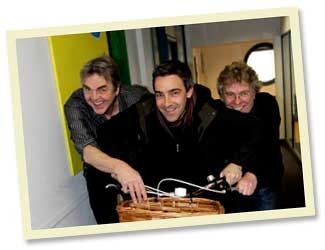
I guested on the Word Podcast this morning. You can listen to it via iTunes or just go here first if you like. It is the one podcast I listen to every week, without fail, as it appeals to me on every level. It is, therefore, a rare treat to take part in it, and to set the world to avuncular rights with David Hepworth and Mark Ellen, whose unbounded enthusiasm for doing just that, after all these years, is infectious. Frankly, it's nourishing enough to listen to the old couple, let alone get to add your twopenneth. You raise your analytical and observational game in their presence. It is required. So bracing! Above is a daft picture of the three of us taken in the corridor on somebody else's bicycle, possibly somebody off Lark Rise To Candleford.
Anyway. One of the things we discussed in the alloted hour was Radiohead's new album The King Of Limbs. Its arrival announced last Tuesday, it "dropped" on Friday, I think, a day before it was announced to "drop". (As David asked on last week's podcast: why preempt it even by a few days? If you're really circumventing the conventions of the record business, why not just release it, without any warning whatsoever?) I downloaded it on Saturday, and have listened to its fairly stingy eight tracks a number of times without judging it. I have now had it in my ears for six days, and I'm ready to say what I think of it without buckling under the pressure of the mad rush of instant reaction that has characterised its appreciation in cyberspace, and in print. Now, I love Radiohead. Without me ever thinking of them as mah favourite band, they kind of are one of mah favourite bands. I have liked them since, if not the very first notes of the first track on the Drill EP, certainly since I first saw them play to a near-deserted Astoria theatre in London, 1992, where they were the first support band on. (Their PR, the late Philip Hall, had convinced me to accompany him, and guess what, it was Creep that turned my head. I cannot find out who the main band was. Anybody know?)
I liked Pablo Honey, although its awkwardness seems less significant now. I was sent by Select to interview them, having had to do a really hard sell on them to editor Andrew Harrison, who viewed them, understandably, as just another English indie band, perhaps even grunge wannabes and as such square pegs in the effete world of Suede, St Etienne and the Auteurs. They turned out to be a lot more than that, of course. I met them in Oxford and remember fondly the thick-cut, unsliced bread which I think Colin Greenwood toasted for us, as we sat at the pine kitchen table. Off we went in a Transit van to Treforest in South Wales, where they played to a half-interested but eventually won round student crowd in the union at Glamorgan University. I interviewed Thom Yorke in the van, and we bonded over a shared past at art school. I found him smart and funny. He had that spiky peroxide hair at the time.
That was, as far as I can recall, the only time I have spent with them. I'm glad now, looking back. They had not been to America at the time, and had not been driven to the very lip of insanity by fame and fortune. I'm sure it's a fascinating thing to meet Thom Yorke now. As it stands, I've spent most of their career as a fan, rather than as their priest, "sixth member" or loyal Boswell. I still think Kid A is their best album, with Hail To The Thief a close second, which seems to be a fairly unusual configuration, but there you go. Their gig at Earls Court on the Hail To The Thief tour remains one of my favourite of all-time, and that's in an arena with fold-down plastic chairs. I was knocked out by the sheer collective industry afoot onstage, and how intricately they worked together. And Yorke is a real showman. I liked In Rainbows, although felt uneasy about not having it on my CD shelf, along with all the others. (I don't own a physical product of it.)
The King Of Limbs is the first Radiohead album to make me feel the way I felt about REM around the time of Up and Reveal. I had gone with REM as they'd become more and more successful, and adored New Adventures In Hi-Fi, but there seemed nothing new about the albums that followed. They were fine. They were REM. They did not set my world on fire, and I longed to feel how I felt about Green, let's say, never mind Murmur or Reckoning. Radiohead sound like Radiohead, which is no crime. Nobody else much sounds like Radiohead, after all, but as Mark pointed out in today's podcast, the beginning of each of the eight tracks on The King Of Limbs sounds ultimately alike. I'm happy to hear a jittery refrain, and a spidery, jazz-inflected beat, and Yorke's haunting coo, but I fear my expectations are too high for this to be enough.
There are good tracks here, like Morning Mr Magpie, Lotus Flower, Separator – tracks that the likes of The Vaccines, or Florence & The Machine, or the Cold War Kids, or the Killers can never even dream of creating – but nothing so far to knock my socks off, like There There and Myxomatosis did on the very first listen to Hail To The Thief, or Idioteque on Kid A, or Pyramid Song on Amnesiac, or Weird Fishes/Arpeggi on In Rainbows … Could it be that this is the first makeweight Radiohead album? The first stopgap? The first album they should have actually just released for free?
I will continue to listen to The King Of Limbs. That's the difference between it – a substandard Radiohead album – and pretty much every other album I've listened to with great expectations over the last two years. It still has my attention. Because even a bad Radiohead album – and to date there isn't one – would be better than most of the other albums I've listened to over the last two years. But on my next Tube journey I might rather listen to James Blake by James Blake. Or a shuffled playlist of old favourites. Or an old Radiohead album.
It's a weird fish.








February 18, 2011
Vauxhall and we
Another crazy, crazy, crazy night out at Karaoke Circus. I've been slack and missed a couple of consecutive KCs in London, including the Christmas extravaganza, although I was lucky enough to be at, and a part of, the Edinburgh circus tent special in August. Anyway, having moved the circus to my half of London, boldly relocating to Vauxhall – home of the RHINO NOT FOR SALE sign – and specifically to the Royal Vauxhall Tavern, one of the gayest bars in the world, you might call last night's something of a rebirth. The venue was just perfect: cosy and circular, and with more gents toilets than ladies, but big enough to accommodate and in many cases seat a teeming intake of "Yay!"-shouting, homemade-cake-eating comedy nerds. And the staff were terrific, especially Paul the barman who got up and did a criminally soulful open spot of Dock Of The Bay and won! All round, a happy evening, with highlights too many to list, although I'll chance a couple, for fear of picking favourites: Robin Ince's Rise, which even the eminently adaptable house band of Martin, Danielle, David and Foz couldn't breathe life into, and which Robin turned into irascible performance art (increasingly his metier); Howard Read's Rhinestone Cowboy which involved actually vandalism; husband and wife team Margaret Cabourn-Smith and Dan Tetsell making the most of their babysitter by reimagining Beyoncé and Jay-Z's Crazy In Love; and Pappy's bringing the house down, very much in the spirit of Karaoke Circus's new gayness, with a costumed and then not-costumed celebration of It's Raining Men. A pair of denim shorts was thrown.
As for my own contribution, which has had me playing the same song over and over and over and over again on my iPod for a week in order to learn it, I paid shouting tribute to Carter USM's The Only Living Boy In New Cross (which, again, seemed apt for the new South London location). I still forgot the middle of the "Eyes down" bit, but I think pulled it back from the brink with gusto if not finesse. I believe I am right in saying this was a Karaoke Circus first: a song sung while the original singer of the song was in the room ie. Jim Bob, who was gracious in his assessment. I apologised to him from the stage, of course. There are tribute acts and there are "tribute" acts.
Thanks, as ever, to Martin and Danielle for having me. I can't think of a more sociable family of people, which includes all of the audience. On the way home, through the tunnel under the railway line, I passed The Baron and Foz without their clown makeup on. I hardly recognised them. A poignant end to an outrageous evening. The photos are Paul Bailey's and the full set are here.
And here's a dodgy mobile video made by Frog Morris of my Carter turn, complete with judging by Daniel Tetsell, Jim Bob and The Baron.
And a couple more shots, these from Diamond Geyser, of Paul the barman collecting his prize, and, well, an action shot of me. The full set is here.








I'm so 20th century
There are not enough hours in the day, as the band Gomez noted. I am a voracious reader. I am also self-employed. These two truths do not rub along too easily together. I am one of those people – not rare – who always has more than one book on the go, a couple at home, one in my bag for public transport. At the moment I have three books on the go that I wish I had more time to read. I'd like a week off work so that I could concentrate on one and finish it. Then I could add a new one to the carousel and not get enough time to read that. When you are self-employed, you become very conscious of not working. (Word recently gave me two books to read and review, which means reading and working – Nileism by Allan Brown and The Celestial Café by Stuart Murdoch – so I put my leisuretime books on hold and read those.) My other problem is that I tend to pick big, fat books, which take up a lot of space in my bag which might be more usefully employed for a packed lunch.
My three books are, as pictured, Israel by Martin Gilbert (first published in 1998, but revised in 2008), The Kennedys: An American Drama by Peter Collier and David Horowitz (published in 1984), and When The Lights Went Out by Andy Beckett (published in 2009). The first, which I bought and started reading in 2009 after the three-week Gaza War and put aside when it was usurped by something a little easier, is back in circulation because of Peter Kosminsky's The Promise on C4, which has not just reignited my interest in the troubled region, but underlined how little I know about its history. I aim to rectify that.
The second I bought in 1988 when I was co-writing a daft play about the assassination of JFK called President Kennedy's Big Night Out. This was in the dark days before the internet, and the quickest way to "research" his shooting was to buy a book that covered it. I only read the assassination chapter at the time, and filed the book away for what turned out to be over 20 years. I plucked it from the bookshelf before Christmas after yet another documentary on TV about the Kennedys. Even though the family tree that's helpfully supplied ends in 1984, at which point lot of Kennedys now dead were still alive, it's their rise to prominence that I'm interested in and which is proving fascinating. It's not just about trivia, but you'll love this: in 1929 patriarch Joseph Kennedy made so many phonecalls to his lover Gloria Swanson that he had the highest personal phone bill in America for that year.
The third book is the easiest read of the three, although still unwieldy as I have it as a pre-publication advance proof, with a plain orange cover. Over Christmas and New Year, this was the book, and I was getting through its detailed political history of Britain in the 1970s at a rate of knots not seen since I rattled through the complete works of David Peace two years ago. (A rare excursion into fiction, although his novels are so rooted in history, they almost count as non-fiction.) When The Lights Went Out I would recommend to anyone who's interested in the way we live now, since so much of the pain we're feeling in 21st century Britain has its origins in what happened between the election of Heath in 1970 and the election Thatcher in 1979. It deserves finishing. I owe it that. I owe Andy Beckett that, for all his thorough research, and all the dying 70s politicians he interviewed in the process. But Sir Martin Gilbert, a historian who has written more books than most of us will read in a lifetime, has barged Beckett off the top of the pile. I will return to Britain in the 70s, of course, but for much of the foreseeable I'll be at the birth of a nation in Palestine.
So, like some kind of time traveller limited to the 20th century, I'm currently in Britain in the 1970s circa the Social Contract, Palestine in the 1920s circa the Balfour Declaration, and Hyannis Port in the 1940s circa the death of "Young Joe" Kennedy in a disastrous American bombing raid called Operation Aphrodite. Each time I pick up a book, I have to reacclimatise to the era and the climate. What I observe about myself, with no forward planning about what I'm going to read next, is that I am clearly a 20th century man. I have spent the last 15 years educating myself. I was no good at history at school. I'm not sure it was as interesting at O-level in the 70s – my main memory was the Industrial Revolution: canals, looms, the Stockton-Darlington line – and I certainly struggled to engage with it. I failed O-level history. In fact I got a "U" grade, which isn't a grade, as it stood for ungraded. So, in my thirties I returned to the subject and filled my shelves with history books. I even joined a history book club, which meant one new paperback a month. I read about the Reformation, and about the two World Wars, and about the Russian gulags, and the Vietnam war, and … actually, apart from the Reformation, you can start to spot a theme. I devoted myself to understanding the 20th century. I'm still at it.
History is so much more fun when you plan your own curriculum. I think researching my biography of Billy Bragg in 1997 – using books, as I was pre-dial-up – really concentrated my mind on getting to grips with the century we were then still living through. Not all history books are fun to read. Some are dry. Some, like John Keegan and Eric Hobsbawn, are not. I'll be honest, Israel is fairly dry – which is apt, I guess, as the very inhospitability of the Arab soil lies at the heart of the Zionists' story, of the physical struggle and determination to lay down roots in a foreign land they felt was theirs, and the century of trouble that led to – but I will persevere. I notice that Simon Sebag-Montifiore has a new book out called Jerusalem, and he's a very readable historian, but that doesn't fit in with my New Year's Resolution, which I am determined to stick to: only read books I already own.
I will review all three books when I finish them. I can see in a secondary pile Robert Service's biography of Lenin and a brilliant book about post-Communist Russia called The Oligarchs by David Hoffman, both of which I started and set aside when more pressing reads took over. I will return to those first. Because I already own them.








February 13, 2011
This much is true
After Never Let Me Go, I needed to see something that was going to live up to expectations. True Grit fulfilled that brief. I speak as a fan of classic westerns, a fan of the Coen brothers, a fan of the Henry Hathaway original, a fan of Jeff Bridges and Matt Damon, and a cynic of Hollywood remakes, which, for all the dressing up, this is. The Coens use the Brighton Rock Defence and claim that their True Grit is a remake of the original 1968 Charles Portis novel and not the 1969 Hathaway film, which won John Wayne his only Oscar. Certainly, the novel seems to have revolved around its 14-year old protagonist Mattie Ross more than in the subsequent first film, which became a vehicle for Wayne as fat, drunken, one-eyed marshal Reuben "Rooster" Cogburn. Here, although Bridges eats up the screen with his own drawling take on the character, Mattie (played near-miraculously by then-13-year-old Hailee Steinfeld) reclaims centre stage. It's her film – which is to say, it's Steinfeld's film – and in that sense, the Coens have repositioned what most people know as a John Wayne film incredibly successfully.
I love the original, but that's really because I have an enormous soft spot for Wayne and for the mythic iconography of the western. This is not a "revisionist" take on the genre; it is an overwhelmingly affectionate tribute to the great westerns of the past. The Coens love westerns. Some of their previous work hints at this: Blood Simple, with the cowboy boots and pistols of its Texan setting, might structurally and thematically be described as a modern-day western as much as a neo-noir, O Brother Where Art Thou? has a western-style relationship with the wide open spaces of the American landscape, while No Country For Old Men might as well have been a dry run for their first, full-on cowboy film set in the Old West. They were born to do True Grit. And what a triumph it is. I don't often see films that bring to mind the word "faultless", but this did.
The fact that it's a remake, and that the story is so familiar to me, becomes irrelevant almost instantly. The Coens make it their own. The script is so beautifully crafted and sculpted, and witty without being jokey, it is a pure delight to listen to. In the mouths of Steinfeld, Bridges and Damon, this highly decorative but homogenous language takes on its own character, and whether it's an exchange between Mattie and the horse trader, or Damon's LeBoeuf and Cogburn, or Mattie and outlaw Ned Pepper (Barry Pepper – what a fortuitous bit of casting!), their individual relationships emerge. There's some fine, nuanced acting going on here, and if Steinfeld and Bridges don't scoop up something at tonight's Baftas or next week's Oscars, there is no justice.
The Coens are prone to irony, which is what makes their comedies such fun, but when they step back from this fruitful form of postmodernism and play it a little more sincere, it pays dividends. (For instance, I enjoyed Burn After Reading, but feel no need to see it again. I have watched Fargo many times, and Blood Simple, come to that. Oh, and I hated The Ladykillers just as much as you did.) Although True Grit is a genre picture, it does not seek to overturn or modernise – or "revise" – that genre; it is reverent to its source, and as formal as they promised at the outset: the iconography is present and correct – there's a truly stunning shot with the three riders, Mattie, Cogburn and LaBoeuf, captured within a glorious landscape (New Mexico stands in for the Choctaw Nation or what became, in 1907, Oklahoma) and it's simply perfect – and the soundtrack, by longtime collaborator Carter Burwell, breaks new old ground by working in hymns of the time, thus making it ineligible for the Best Original Soundtrack Oscar, the same cruel fate that befell Clint Mansell's impressive score for Black Swan.
If you don't like westerns and what made the classic westerns great, you might understandably not like True Grit. (There were three teenage boys in the row in front of us at the Curzon who were fidgeting and rustling crisp bags most of the way through it – I'm not 100% sure what they were doing in there in the first place.) But the Coens' attention to texture and composition as well as to performance and language make it one of their very finest works. And who would have guessed that from the news that they were doing a remake? It stands with the very best westerns; for me, it's the equal of Unforgiven.








February 11, 2011
A good idea on paper
 I had two choices at the Curzon this afternoon (because I work on Saturday mornings, I often give myself Friday afternoon off in lieu and treat myself to a film): True Grit and Never Let Me Go, both preceded by hype, both packed with actors I like, both weighed down with awards and/or nominations. I chose the latter, which, on a drizzly afternoon when I was a bit tired anyway due to early starts, was the wrong choice. At least a big, fat western would have woken me up a bit.
I had two choices at the Curzon this afternoon (because I work on Saturday mornings, I often give myself Friday afternoon off in lieu and treat myself to a film): True Grit and Never Let Me Go, both preceded by hype, both packed with actors I like, both weighed down with awards and/or nominations. I chose the latter, which, on a drizzly afternoon when I was a bit tired anyway due to early starts, was the wrong choice. At least a big, fat western would have woken me up a bit.
Never Let Me Go, directed by Mark Romanek (the impressive One Hour Photo and, among a long CV of pop videos, the magnificent Hurt), and adapted for the screen from the 2005 novel by Kazuo Ishiguro by Alex Garland, who can also write a novel, it has all the hallmarks of quality. It has subtle titles; it is bleached out; it is slow; it drip-feeds information rather than – like, say, Outcasts – beats you around the face with signposts; and its acting is subtle and quiet. This is not a film to please dimwits. However, it is a film to displease me. Having read the rave reviews I am now concerned that it may be me, rather than the film. While editing the reviews of the new releases for Radio Times this week, I suggested we take out mention of the story's central premise from the review, because to know it is to have a huge slice of your potential enjoyment taken away before it starts. (Most reviews I've read give it away – at least Sight & Sound warned of spoilers in red letters – so if you don't know it, read nothing. There will be no giveaways here.)
It's possible that knowing the "twist" (it's not a twist that comes at the end, which is why I use speechmarks) reduced my own enjoyment of Never Let Me Go. It's also arguable that the opening scene, although elliptical, gives it away too. Either way, a lot unfolds from a seemingly benign first act in a very measured and intelligent way. It moves at its own pace and gathers to a sort of climax, although not one that's climactic in the popcorn-munching sense. Am I being vague enough? All you need to know is that the action hinges on three performances: Carey Mulligan (whose character Kathy also narrates), Keira Knightley and Andrew Garfield. I am an admirer of the work of all three, even Knightley's. Unfortunately, we don't see their characters as adults until about midway through, as the first act takes place at an enigmatic English boarding school – so we're stuck with child actors, none of whom are bad, but all of whom are children, and as such, an elongated tease before we get to Mulligan, Knightley and Garfield.
By the time the action catches up with our heroes in young adulthood, it's been a pretty dull ride. It was only when I emerged into the light from the film's overriding browns and greys, that I realised what has failed to ignite. It's a classic case of film-based-on-a-novel. I can imagine its langourous pace and gentle act of unfolding working superbly on the page, when you are forced to imagine it all; likewise, the eloquent narration of Kathy is designed to be read, not listened to, or at least, not listened to in the context of a dramatisation that's intended to make fictional events real. I'm not against narration per se – unfashionably, I like Blade Runner with the voiceover – but it can pall when there's this much of it. Garland apparently wrote the script before the novel was published, that's how certain he was that it would make a film. Well, it does. But my guess is that it makes a better book. Damn, I feel as if I must be some kind of philistine for not getting much out of this film. It has not affected my love of the actors, or the filmmakers. We just passed each other by, somehow. I wonder how those who have read the book will feel?
Still, True Grit tomorrow. That was a novel too. Narrated by a female character.








February 9, 2011
I wasn't a miner
Yesterday, I posted the following thought on Twitter, seconds after it had crossed my mind:
God, writing comedy is hard
The reason I wrote it is because I am currently writing comedy, and it is hard. Without going into specifics, which would surely jinx the project, I have been commissioned to write my first ever solo sitcom for radio: four 30-minute episodes, for Radio 4. I'm pretty sure I've mentioned this one before, as I originally pitched it – via a production company – for TV, specifically, BBC2. It went into development at BBC Comedy at the beginning of 2009. This means that I got paid to write a single pilot script. (This is a jackpot of sorts, as the self-employed writer spends a demoralising percentage of his life in meetings that pay nothing, and writing pitch documents, proposals and even scripts "on spec" that also pay nothing.) After I'd delivered the sixth draft of this script, honed and refined over the course of many script meetings and copious notes exchanged between me, the production company and our potential exec at BBC Comedy, they passed on it.
The production company, a tenacious outfit who are very good to have on your team, did not shelve it. They pitched it to Radio 4, who, last year, commissioned it. Give or take an Edinburgh Fringe, an attempted holiday and an unexpected windfall of 6 Music cover, I have been writing it ever since. I have not finished yet. My first deadline was before Christmas. We record it in the first week of March. The studio is booked.
The process is hard. Even the deceptively simple task of converting the existing pilot script from TV to radio was trickier than I'd expected. Also, the "story arc", such that it is, was originally mapped out across six episodes and now we have four. Result: I foolishly crammed all six episodes' worth of story into four and it quickly became overloaded. I thought I'd finished episodes 2 and 3 but, after some soul-searching and brutal but necessary script editing, it was agreed that the whole thing needed a reboot. I went back to basics, stripping out entire plotlines, and rebuilding the eps I thought I'd finished. This took time. It is ongoing.
So for me, right now, writing comedy is hard. A privilege, yes, but hard-won. I learned my trade writing solo, on Family Affairs and EastEnders, but both had an existing "bible" and ongoing storylines, so my job was not to create, it was to maintain. The sitcoms I have worked on that went to air, Grass and Not Going Out, were both collaborative. The entirety of Grass was written in a series of airless rooms with Simon Day. The first series of Not Going Out was written in an airless office with Lee. (Subsequent series have been built around collaborative story conferences and solo writing, exchanged via email with Lee.) I have never written a series on my own before. I'm learning the whole time.
That said, the first comedy series I ever wrote, or co-wrote, for the original Radio Five in 1993, was Fantastic Voyage, a wacky, six-part spoof of youth TV designed and commissioned as a vehicle for me and Stuart Maconie. We wrote it together, although it was ultimately a series of linked sketches, so story arcs and plotlines were not required on that particular voyage. The point remains: my first ever scripts were radio scripts. So it's a homecoming of sorts.
Anyway, I'm not angling for sympathy. It's my job. Or at least, writing and talking are the services I offer as a self-employed business, and writing a comedy for Radio 4 exists within that brief. Don't get me wrong: I'm thoroughly enjoying it when the words come naturally and the characters come alive, or when I think of a funny joke; I'm thrilled to be writing something for Radio 4; and it is head-spinning to be in discussion with such fine actors and performers as we nail down the casting. (Again, no names, for fear of the jinx.)
In the same way that book covers are usually designed before you have delivered the manuscript, we have already commissioned the theme tune from a musician I greatly admire and it sounds fantastic. (All will be revealed.) I call it my "sitcom" but it won't be recorded in front of the usual Radio 4 studio audience, as it's not that kind of comedy. It's closer to a comedy drama – eek! – although the current rewrites are dragging it back towards comedy. To quote a superb line from my Radio 4 Comedy Guidelines, "the absence of a studio audience does not give you permission to be unfunny'! Lessons: being learned.
Unfortunately, after Tweeting that writing comedy is hard, a gentleman using a pseudonymous Twittername in Manchester was moved to respond thus:
No. Being a miner, teacher, police officer etc. is hard.
He is correct, although the implication was that I was not entitled to find my own job hard, as some other jobs are harder. This reminded me of some of the undeserved flak Richard Herring drew when he was self-deprecatingly complaining on Twitter from his lonely dressing room about low audiences at the Leicester Square Theatre – again, as if complaining about his job was disallowed because it was not a hard enough job.
Firstly: being a miner and being a writer are hard in their own, quite different ways. One is physically hard, the other is mentally hard. One involves danger, both short term and – medically – long term, the other categorically doesn't, outside of repetitive strain injury. But it is romantic in the extreme to imbue one with a sort of nobility of difficulty that cancels out any strife experienced elsewhere. I spent an inspiring hour talking to Ken Loach this week, and, old fashioned lefty that he is, he's all about representation of the working man. The writer he worked with the most in the early days was Jim Allen, a man who'd been a miner, and a soldier, a factory worker and a fireman, as well as in prison, before he turned to writing. His writing reflected those things. Presumably, if he'd Tweeted that writing was hard, that would be OK? (He is one of my favourite screenwriters. Check out Land And Freedom, Raining Stones or Hidden Agenda.)
I do not have access to a miner, but my brother has been a police officer for some years. I know full well what his job has entailed at the various levels he's worked at. I could not do it. I would find it "harder" than writing comedy in the sense that I do not have the required mindset to impose authority on strangers, nor to wear a uniform. I'm sure I could learn the things you have to learn to be a police officer, but that's only a fraction of the job. I know plenty of teachers and although I have lectured students, I would be unsuited to teaching a classroom of children. Thankfully, we are all suited to different things, and I admire my friends who are teachers, in the same way that I admire anyone who does something that I can't do.
I can write and talk to a standard that seems to be sufficient for these two basic skills to support me, financially. (And not support me financially when the work isn't coming in.) I am grateful for the anonymous Mancunian Twitterer for giving me pause for thought – Am I being an outrageous bourgeois twat for daring to complain in less than 140 characters about my job? – but his objection is without useful foundation. We all do what we can, and we all do what we have to in order to eat. We should respect everyone around us, whatever their pay scale, and we should allow everybody to have a bad day and a moan.
Oh, and by the way, if you feel I am putting way too much time and effort into defending myself against the Tweet of a man who does not have a name, it's because writing comedy is hard, and I needed to write something that is not comedy before I get back to my job.








February 8, 2011
Pier pressure
Catching up with a couple of films I've seen at the Curzon recently. I'd prefer to gloss over Hereafter, but I fear I cannot let this one go. It's already one of the worst films I've seen this year, and since it was written by the unfeasibly talented Peter Morgan (The Deal, The Queen, Frost/Nixon), and directed by the usually solid Clint Eastwood, I'm concerned that the film I saw isn't the film they made together. An attempt at the Alejandro González Iñárritu/Guillermo Arriaga trick of weaving together a number of seemingly disparate narratives using one inciting incident, it stumbles at many fences. In it, Matt Damon (again, a reliable presence – albeit perhaps working too hard) plays a reluctant psychic in San Francisco, Cécile De France plays a journalist who cheats death when caught up in the Asian Tsunami and subsequently finds it impossible to relate to anybody who hasn't, and two 12-year-old twins (Frankie and George McLaren) cope with a tragedy in London in a way that's also linked to psychics. You don't need to be a psychic to foresee that their stories will interact – in the sense that nobody is going to make a film about three separate people in three different countries across three different continents that didn't – but you will, to be fair, be pretty astonished by the unlikely manner in which that eventually, eventually happens. I won't spoil it for you, obviously. Needless to say, the moment "London" is established with a lingering shot of Tower Bridge, you'll know you're not in for a subtle ride.
If, as legend has it, Clint is a restless director who dislikes doing too many takes, then he was the wrong director to direct Frankie and George McLaren, who carry a third of the film, and need a lot more attention than Clint was prepared to give them. The French section (look! the Eiffel Tower!) is equally unconvincing, despite being subtitled. The American section, most confidently presented, is also the least satisfying narratively, as we are asked to invest a lot of time and effort into the potential romance of Damon and Bryce Dallas Howard, who cutesy their socks off at an Italian cookery night class taught by one of the Sopranos, but there is no payoff.
The only sequence worthy of note comes at the beginning: the brilliantly conceived special effects bonanza of the Tsunami itself. After that, sadly, it's all downhill. As it kind of always would be, structurally. Atypically for the Curzon, people were talking in the cinema during Hereafter, as if the film wasn't irritating enough. I suspect the people talking were as bored as we were. Just ruder.
Brighton Rock was a much better bet. (There was a grown man, on his own, furiously biting his fingernails and checking his mobile throughout, but he stopped when politely admonished.) It's suffered some pretty harsh reviews, so I feel defensive about it. But then again, writer/director Rowan Joffe – making his theatrical feature debut as a director here – apparently revealed in an interview that he's a fan of the Collings & Herrin Podcast, so maybe that's it. I am compromised!
Sold as a remake not of the classic 1947 film starring a 23-year-old Dickie Attenborough but of the classic 1938 Graham Greene novel, it was pointed out in Sight & Sound by Philip Kemp that this is a disingenuous defence, as the now iconic ending (which I won't reveal, in case you haven't seen or read the original) is taken from the film. I'm not worried about the purism or otherwise of the adaptation, as I've not read the book, only seen the film, and since Joffe has cleverly moved the action to 1964 for a Mods and Rockers setting, it's immaterial.
Pinkie, the scarfaced teen hoodlum, is once again malevolent, brutal and unforgiveable in the hands of Sam Riley, formerly Ian Curtis in Control. (Incidentally, at the beginning, Riley comes face to face with nemesis Fred Hale, played by Sean Harris, who played Ian Curtis in 24 Hour Party People – a coincidence of casting, or a deliberate pop-cultural nod?) Helen Mirren, Phil Davis, Andy Serkis and John Hurt bring some veteran ballast to the cast, but it's Andrea Riseborough who impresses the most as Rose, so innocent when we find her, so corrupted – knowingly and otherwise – when we leave her. It's a finely nuanced performance that changes with the story, and one that actually makes some of the older actors seem a bit practiced and one-note. (I guess that's the nature of the character.) Joffe has symbolic fun with Greene's Catholicism (Pinkie and Rose are both "Roman"), but perhaps lays it on a bit thick, with a distorted view from above Christ himself on the cross to a tiny penitent Rose in church, and lots of celestial light and choirs invisible. But then, this is not a film that lays anything on thin. It's a noir after all, albeit one in colour. The scenes inside the Continental Hotel where Andy Serkis's crimelord presides are like fantasy sequences, in stark contrast to the more realist scenes on the pier and seafront.
It actually feels like a sleazier remake of Quadrophenia; I kept expecting to see Sting as a bellboy and Lesley Ash in a fishtail down an alley. Joffe even moves the final scene from the pier to Beachy Head at Eastbourne, where Phil Daniels' scooter went flying. This was clearly a cinematic decision, and I guess it puts some clear blue sky (or some inky black sky) between Joffe's version and the Boulting brothers'. But it also leaves Brighton some miles down the coast, which for me was a mistake, given the film's title. It left me asking this fundamental question: why bother remaking Brighton Rock at all? Is there an artistic difference between this and, say, remaking Hawaii Five-0 for network TV? What? Just because it's based on an old novel? Either way, you're essentially trading on an existing brand, which will deliver a ready-made audience in a certain mood. But it also inevitably leads to odious comparisons. So, really, why do it? Why set yourself up for that grief? Why not write something new about Catholicism and the seaside?
I actually really enjoyed the remake of Hawaii Five-0, by the way, which started on Sky1 this week. It trades on an existing brand, which delivers a ready-made audience in a certain mood – the mood being: I used to love this as a kid – will they keep the theme tune? (They did. They're not daft.)








February 3, 2011
Back after these messages
I am a subscriber to the public satellite broadcaster British Sky Broadcasting, formed by the merger of Sky Television and British Satellite Broadcasting in 1990, in which News Corporation has a 39.1% stake. News Corporation, whose chief executive officer is Rupert Murdoch, is the third largest media conglomerate in the world, after Disney and Time/Warner. I have been a subscriber since 2007 when I moved into a rented house that already had a dish erected on the roof. Before that, I was a subscriber to the cable service NTL, because I had an aesthetic aversion to satellite dishes, but the sheer convenience of the ready-erected dish on the roof of a house I didn't own turned me. I have always found Sky's service friendly and accessible, and have enjoyed both the minimum and near-maximum (minus sport) packages they offer. Indeed, I have added and subtracted packages all the way along, to suit my needs and financial situation. I am not here to sell you a Sky subscription, any more than I am trying to sell you a holiday cottage in Ireland when I refer to time I have spent there. I wish to review the newly-launched channel Sky Atlantic, and I do not wish to be accused, as I was on Twitter on Tuesday, of selling anything.
You don't need Sky Atlantic, but since existing subscribers didn't have to lift a finger to receive it, I have now got it, and I am happy about that, as I prefer US drama to UK drama, on the whole. It's a great shame that the BBC couldn't compete with Sky's deep pockets when bidding for Mad Men, the second greatest current US drama on television, but the BBC can't win: if it paid out a whopping sum it would be accused of commercial opportunism and wasting the licence-fee-payer's money on profligate luxuries that very few people actually watch. (I think it got 500,000 viewers on BBC4 and that's after media hype money could not buy.)
I remember, about ten years ago, then-boss Elisabeth Murdoch's dream of turning Sky into a "British HBO", showing quality drama both imported and homemade. It was around the time that she commissioned longer-than-average runs of new Brit sitcoms Baddiel's Syndrome (13 episodes, compared to the standard six or eight for a new show) and Time Gentlemen, Please (two series of 22 and 14 episodes). It never happened. But now, with multiple Sky-branded channels in the portfolio, Sky Atlantic has been made possible. The deal it has struck with HBO means it sits on a vast back-catalogue of iconic shows like The Sopranos and Mad Men, plus assorted other big network names from the past like ER and Star Trek and 24. But there's nothing to review there. Most of us who love the cream of long-form US drama have learned to wait for the DVD box set. It's proven to be the most satisfying method of consuming them. I might not have fallen in love with Battlestar Galactica and The Wire if I hadn't been able to gorge on them.
The jewel in the crown of Sky Atlantic's launch has been Martin Scorsese's Boardwalk Empire, a series that has been so comprehensively fanfared most of us feel like we've already seen it. They showed the pilot on launch night (uniquely directed – rather than just executive produced – by Scorsese), and Ep2 on the following night. Ep3 we have to wait until Saturday for. It is set in Atlantic City in the 20s, so it feels as if the whole show has been tailor made to show off a channel with Atlantic in the name. Either that or they named the channel after the show for maximum synchronicity. Either way, if it's a channel-defining show, we're in safe, if predictable hands. Created not by Scorsese but by Terence Winter, and with some episodes directed or co-written by Tim Van Patten, both alumni of The Sopranos (what a catalyst that show turned out to be), it takes place on the same famous boardwalk where Tony Soprano once trod, except 80 years before. It's another gangster fable. If it feels derivative, and it does, it's derivative of the best work of its own creators. Scorsese wrote these clichés. They're his to feed off, and Winter's and Van Patten's to adapt, having paid explicit homage in The Sopranos to the great gangster movies of the past.
John Crace gave a mealy-mouthed assessment of the first episode in the Guardian. I fear he was reacting against the hype, which is understandable. Although many of his complaints have been erased by Ep2 – he felt character development was perfunctory and that the whole thing was a little flat – I personally really enjoyed it. And I speak as someone who thought Scorsese had gone well off the boil and actively disliked The Departed and Shutter Island. He managed to filter a bit of both into Boardwalk, but the material was so much stronger. Despite the period difference it felt more like Goodfellas. It goes without saying that Steve Buscemi carries off central protagonist Nucky Thompson with weaselly aplomb. He's been a leading man for many of us for years, as we've watched him squished away in supporting roles. An inveterate scene-stealer (whose heart didn't leap every time his private eye turned up on 30 Rock?), he's no Soprano. Indeed, he was squished away in a supporting role in The Sopranos, but that was close to a one-man show, where all orbited Gandolfini, and here, so far, it's much more multi-character.
There are a lot of actors called Michael to watch. I'm already fascinated by Michael Shannon as the gruff-voiced G-man; and associate/nemesis Rothstein, played by Michael Stuhlbarg; not to mention Michael Pitt as Leonardo Di Caprio, and briefly-glimpsed Michael Kenneth Williams (Omar!), of whom I am hoping to see more. The ladies don't get much to do yet, beyond wiggle their bosoms and speak like Lina Lamont in Singin' In The Rain, and Kelly McDonald – the statutory Brit! – has yet to dig in with her Irish accent, but there's a long way to go yet. Those unwilling or unable to subscribe to Sky will be able to buy it in a box soon, no doubt.
Overshadowed in all the fuss about Boardwalk was another premiere on Tuesday night: Blue Bloods. A much less showy piece of work, it's a much more standard, contemporary, shakycam police procedural, set in New York, and with the various narrative strands very clearly telegraphed in Ep1 by creators Robin Green and Mitchell Burgess (more Sopranos alumni!), but it's up my alleyway, I'll be honest. Tom Selleck is perfectly cast as the doughty patriarch of an Irish-American police dynasty, with his eldest Donnie Wahlberg (older brother of one of Boardwalk Empire's exec producers, Marky Mark) proving something of a handful in terms of playing by the rules. Bridget Moynihan is the daughter who just happens to be a DA, and Will Estes is the younger brother, a rookie cop. Don't look like much here – another New York cop show?! – but we have everything. I'm in.
Commercial break over. Back to the action.
While we're here, in the rough vicinity of imported US drama, may I make a plea about the show I consider to be the greatest currently on TV: Breaking Bad? The valiant FX are currently re-airing season one of this dazzlingly different saga about a chemistry teacher in Albuquerque with inoperable cancer who takes to cooking meth with an ex-student in order to provide for his family after his death. They don't have season two; that belongs to Five, who showed it to little acclaim last year and thus haven't bothered shelling out for season three. This show has won its star, Bryan Cranston, three successive Emmys. It's a pretty big deal for a cable show in the US, where it draws audiences of up to two million to AMC, but here, it does fuck all. I have seasons one and two on box set. But right now, no UK broadcaster seems interested in buying season three. This is a crime. I know there are nefarious ways of accessing foreign telly, but I choose not to use these methods as I am a law-abiding citizen. The DVD is not listed yet on Amazon. What am I to do? Go and live in America? Is that what you want, UK broadcasters? Must I threaten to leave the country like the bankers always do? And then not see my threat through to fruition, like the bankers always don't? SOMEBODY BUY THIS PROGRAMME PLEASE!
Am I wrong? Is Breaking Bad not the finest and most original non-sci-fi drama America has produced this century? I have seen season one three times and I'm still enjoying it again on FX. You can get FX without subscribing to Sky, by the way. But you need to subscribe to a provider. And FX is owned by Fox, which is also owned by Rupert Murdoch. That bastard.








February 1, 2011
Caution, horses
I found myself staying at the Premier Inn, Braintree last night. It was for a family wedding, which was a great success and a lovely day for everybody since you ask, but that's not why I write. In my perfectly serviceable bathroom was a fairly typical sign:
CAUTION
Hot Water
I even photographed it, because I can. It was accurate, in the sense that the hot water tap beneath the sign on the sink, helpfully marked out with red piping, did indeed produce hot water, when you turned it. The cold water tap, in blue piping, produced cold water. I ran that hot tap for a good long time when shaving, and even at its hottest, it was just above lukewarm. There really was no need to warn me of its temperature with a specific yellow sticker on the wall. CAUTION Water That's Nothing Like As Hot As You Expect It To Be, might have been a more helpful and pertinent sticker.
Above the towel rail, as you can see, I was warned again:
CAUTION
this towel rail can get hot
This is not a surprise. It is a heated towel rail. It is designed to get hot. The switch that turns it on and off was outside the bathroom door, and clearly marked TOWEL RAIL. I did not turn it on. It did not heat up. But had I chosen to do so, in order to use up some more electricity while in the room, I would have pretty much expected it to "get hot." I am not actually complaining about my stay in the Premier Inn, which was perfectly serviceable, and didn't cost me that much money. But these danger signs are becoming more and more common, their insidious application to walls and other surfaces clearly driven by fear of litigation, which is one aspect of American culture I was hoping we'd keep at bay, along with prom night, the rude phrase "can I get?" and guns, but we are losing the battle.
I often use the British Library. A more stoutly and traditionally British place you could not imagine, in the sense that it offers a warm, subsidised welcome to people from all four corners of the earth, who crowd its public spaces, speaking in every language under the sun and partaking of something we in London can be justly proud of. But the journey from Euston Road to the front entrance of the Library building is becoming more and more perilous, or so the signage would have you believe. There's a piazza between the road and the doors, which does indeed get slippery underfoot when it's icy or wet. There are signs everywhere telling you this:
BEWARE: PIAZZA CAN GET SLIPPERY WHEN ICY OR WET
Then, if you are brave and intrepid enough to actually traverse this Total Wipeout-style assault course and reach the shallow steps leading up to the front door, you are assailed by seven identical signs, two on each of the three shallow steps and one for luck, which say:
CAUTION: STEPS
These signs, blots on a fabulous architectural landscape, render the otherwise beautiful piazza in front of the British Library laughable. And just that little bit less British. Whatever happened to KEEP CALM, CARRY ON AND MIND HOW YOU GO?
I understand. I get it. Certain individuals must have tripped up the steps at some point. It's an everyday hazard. We all trip up. I tripped up the escalators at Waterloo station last year. I cut my knee. And even today, because I am still wearing my wedding shoes, which have slippy soles, I slipped while crossing the car park of the Premier Inn this morning, and almost skidded into the path of a thankfully slow-moving van. There were no signs up warning me not to do this, so if I had been injured, I could have sued the Premier Inn chain, presumably, and possibly Lenny Henry in person. And by golly, I would have! Although I imagine a crack legal team could avoid liability by shifting the blame skilfully onto the manufacturers of my shoes, which bear no sign saying CAUTION: SOLES CAN PROVE USELESS ON SLIPPERY TARMAC or BEWARE OF ONCOMING VEHICLES WHEN WEARING SHOES IN BRAINTREE.
Have we, the public, become more idiotic and clumsy over the past 20 or so years? Have we lost the use of our senses? Or our legs? Can we no longer commune with the climate and work out for ourselves when it might be icy or slippery? Are we constantly burning our hands on things that are designed to be hot? Or are these alarming signs merely part of some broader conspiracy to keep us all in a constant state of panic and fear, and thus distracted from more important issues such as the fanatical dismantling of a once-decent and compassionate society that was built up in the postwar years when socialism was not a dirty word on the left but was ultimately deemed too hazardous to the forward march of monetarism and free market capitalism to maintain.
WARNING: END OF NATIONAL HEALTH SERVICE
WARNING: END OF FREE EDUCATION
CAUTION: DO NOT BE POOR








Andrew Collins's Blog
- Andrew Collins's profile
- 8 followers





